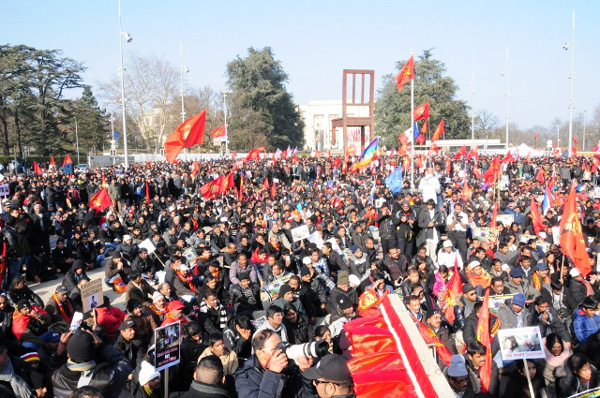Caste discrimination requires legal recognition in the UK
In a landmark vote on Monday, the House of Lords voted to outlaw caste-based discrimination amongst South Asian communities in the UK. The bill was fiercely backed by peers from all parties and passed with a majority vote of 225-153. Yesterday’s vote will bring the proposed bill to the House of Commons, where it needs to be voted upon by the end of the March to be passed into law and become the first anti-caste legislative act outside of South Asia.
The bill in question, Clause 9(5)(a)of the 2010 Equality Act, has previously been enshrined in the anti-discrimination act but has not been activated yet. The current Conservative-Liberal Democrat coalition government remains strongly opposed to the bill, having already announced its planned opposition in a forthcoming vote set to take place in the House of Commons. In the eyes of the government, anti-caste discrimination will do little to abolish caste-discrimination amongst British South Asians. Instead, the government relies on widespread educative measures to eradicate caste-discrimination in the UK. However, with twenty-two Liberal Democrat peers and nine Conservative peers voting against their own government’s stance, opposition to the bill remains fractured.
For British Dalit advocacy groups and anti-caste campaigners, such as Dalit Solidarity Network UK and Caste Watch UK who have strongly advocated the inclusion and enactment of legal protection against caste-discrimination, Monday’s vote is a crucial victory in their struggle for the recognition of caste discrimination outside of South Asia. They argue that Dalits and other British Asians of so-called ‘low caste’ origin deserve similar legal protection as to victims of racial discrimination.
Whilst there are no definitive figures on the number of Dalits or other Asians of ‘low caste’ origin in the UK, estimates vary with some activists citing around 50,000, and others, such as the Bishop of Oxford Lord Harries of Pentregarth, estimating the number of British Dalits to be at around 480,000. According to several participatory studies conducted by anti-caste activists and the National Institute of Economic and Social Research, caste discrimination, harassment and bullying occurs in employment, education and social services in the UK and demands for greater socio-political recognition and legal protection.
However, these findings are highly contested by British Hindu advocacy groups widely considered to be the stronghold of the so-called ‘upper caste’, who continue to lobby against the activation of the anti-caste discrimination bill, such as the Hindu Council UK and the Hindu Forum of Britain. Arguing that caste discrimination has little relevance to communities removed from South Asia, such groups thus claim that legal protection is seemingly unnecessary - and unwanted. Interestingly, this viewpoint has now been adopted by the conservative-liberal government, thereby fostering a culture of negation of Dalit and 'low caste' Asian grievances.
Caste-discrimination affects British Asians of all origins, including British Tamils as shown in a research study I conducted last year amongst the Tamil diaspora globally. Contrary to popular belief, caste, caste based differentiation and caste discrimination continue to mark social spaces and relations even amongst diaspora Tamils. Despite these findings, or arguably because of them, it was also noted that caste remains a highly contentious topic amongst the highly upwards stratified British Tamil diaspora. A similar trend can be observed within most other British Asian communities. With a diktat of social silence imposed upon caste as a topic by largely ‘upper caste’ community members, caste-relations and caste discrimination as a parameter for social interactions continue to be difficult to be uncovered, problematised and tackled. Hence, for victims of caste discrimination, the lack of recognition from within the community as well as the host society and its institutions makes it deeply troubling, traumatizing and almost impossible to demand legal protection and justice for cases of discrimination and harassment. A survey published by the Anti-Caste Discrimination Alliance in 2010 which looked at British Asians in general, found similar views: 58 per cent of those questioned had suffered caste based discrimination and 79 per cent of those did not think the police would understand it if they reported a case of caste based discrimination as a hate crime.
The first case of employment discrimination on the basis of caste brought to a British court (Begraj v. Manak) serves as another example of how the lack of legal, political and social recognition for caste discrimination in the UK undermines the possibilities of achieving justice for victims. After two years, the case Begraj v. Manak in which an Asian employer was sued by a former employee for charges of discrimination, humiliation, victimisation and harassment, collapsed after the presiding judge was accused of bias herself. As a result, justice was denied to the damaged party whose grievances remain uncompensated. If a tough legal framework for caste-based discrimination had existed, outcomes like that in the case of Begraj v. Manak may have been avoided.
The activation of Clause 9(5)(a) of the 2010 Equality Act in the UK would set a precedent outside of South Asia to include caste to race discrimination laws. Caste discrimination would for the first time receive legal recognition as a migratory concept (ie. the issues of caste identity and discrimination migrate with those who bear caste ideologies and markers). It would equally serve as a model example for other states with large South Asian communities, so that they too may adopt similar legal frameworks to ensure protection from possible discrimination. Victims of caste discrimination would be one step closer to achieving legal recognition and protection; and caste would be put on the map of forms of racism and xenophobia as demanded by the UNHRC.
Sinthujan Varatharajah recently graduatated from the London School of Economics and Political Science in Race, Ethnicity and Postcolonial Studies. He is currently working as a research intern at the Institute of Race Relations in London as well as a researcher on Muslims in France and Belgium for Harvard University's and CNRS France's joint academic research network Euro-Islam.


